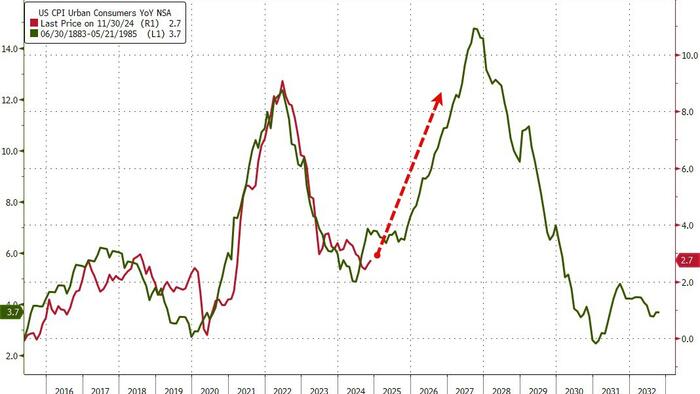


Having accelerated MoM for the past four months, analysts expected today's CPI print (for November) will rise once again to +0.3% MoM and they were dead on (the biggest MoM rise since April). The 0.3% MoM rise pushed headline CPI up 2.7% YoY - the highest since July...
Source: Bloomberg
Core CPI also rose 0.3% MoM (as expected) which pushed it up 3.3% YoY (not even close to the 2% mandate)...
Source: Bloomberg
There has not been a single monthly decrease in core consumer prices since Biden too office.
There is a silver lining however, with so-called SuperCore CPI - Services Ex Shelter - rising just 0.19% MoM which leaves it +4.3% YoY (the lowest inflationary print since Dec 2023)...
Source: Bloomberg
Services inflation continues to slow (but remains very hot) as goods deflation is rapidly reversing...
Source: Bloomberg
On a three-month annualized basis, it is only energy's deflation that is holding CPI back from a much bigger surge with Food Costs up nearly 4%...
Source: Bloomberg
CPI Highlights:
CPI Core:
Details:
The index for all items less food and energy rose 0.3 percent in November, as it did in the preceding 3 months.
The index for all items less food and energy rose 3.3 percent over the past 12 months.
With money supply on the rise again, it should be no surprise that inflation is also rising phoenix-like from the ashes of a pre-election money tsunami...
Source: Bloomberg
Is this what Trump is about to inherit?
Source: Bloomberg
Amid all the rancor of the election campaigns about how voters are clueless as to just how good they've got it - which was echoed by Jared Bernstein this morning on CNBC - Americans (as a whole) have seen real incomes drop 3.3% in the four years since Biden was elected (and up just 2% since the start of COVID)...
Source: Bloomberg
Of course, this includes EVERY American and is adjusted by EVERY item in the BLS CPI basket... how about we adjust nominal incomes for what really matters - food and fuel costs?
Finally, strong employment and resurgent inflation 'data' is not the kind of 'data' that a 'data dependent' Fed needs to justify rate-cuts next week? Or is this resurgence transitory?








